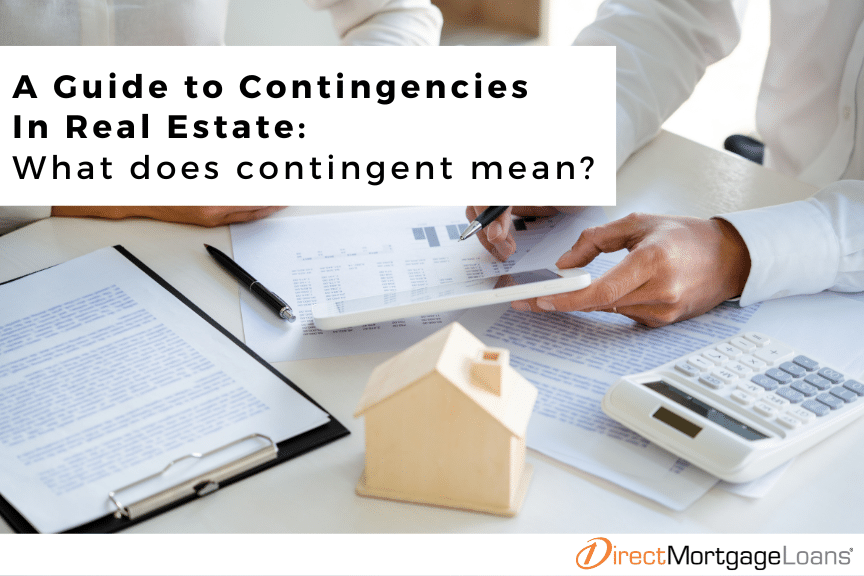If you’re in the market for a new home or are already in the process of buying one, you may come across the terms, contingent, or contingencies. These terms could be a bit confusing, but it’s important to understand what they mean in the real estate world.
In this guide, we’ll break down the meaning of these terms and how they can protect you as a buyer. We’ll also highlight some common contingencies that you should be aware of so you can make informed decisions throughout the home buying process.
Subscribe to our blog to receive notifications of posts that interest you!
What does contingent mean in real estate?
In real estate, the term ‘contingent’ means that an offer has been made and accepted based on certain conditions being met. These conditions could include things like a successful home inspection, the buyer securing financing, or the seller resolving any outstanding issues with the property title. Until all contingencies are satisfied, the sale of the home is not yet finalized.
How do contingent offers work?
Contingent offers are a type of agreement that includes specified conditions that must be met before the sale can be finalized. These conditions are called contingencies, and if they are not met, the contract becomes invalid. The primary purpose of contingencies is to protect the buyer from any issues that may arise during the real estate transaction process
What are the most common contingencies in real estate?
When making an offer to buy a property, you have the option to choose certain conditions, or contingencies, that must be met before the sale is finalized. The conditions you choose will depend on your situation, but some common contingencies include:
Home Inspection
When purchasing a property, buyers could include a home inspection contingency in the contract. This contingency enables the buyers to assess the condition of the property and determine if any repairs or renegotiations are necessary. If the buyer decides to renegotiate, they could ask the seller to reduce the purchase price or make necessary repairs based on the cost of the work required.
Mortgage Contingency
A mortgage contingency provides home buyers with a specific timeframe within which they can secure a mortgage loan for a home. If the mortgage loan can’t be secured within that timeframe, the buyer can walk away without facing any legal consequences. Additionally, the buyer could also have their earnest money deposit returned.
Appraisal Contingency
An appraisal contingency allows buyers to cancel the contract if the home they want to buy appraises for less than the agreed-upon price. This contingency is especially useful if buyers are financing their purchase or if the area’s home prices are highly variable. With this clause, buyers have the option to back out of the agreement if the appraisal value is lower than the agreed-upon price.
Title Contingency
The title of a home indicates the owner of the property and its ownership history. A title contingency clause in a buyer’s offer specifies that the sale is dependent on the property having a clear title with no liens. The buyer is entitled to review a title report which includes the home’s ownership history.
Home Sale
If you want to buy a new home but you need to sell your current home first, you might consider adding a home sale contingency to your offer. This means that the sale of the new home will only proceed if your current home sells first. While this could protect the buyer, it is important to note that in a seller’s market, sellers may reject this contingency because they may receive offers from other buyers who do not have this restriction.
Can you put an offer on a house that is contingent?
If you’re considering a property that is listed as contingent, you could still make an offer. This indicates that the seller has already accepted an offer from a buyer, but the sale hasn’t been finalized yet. By submitting an offer, you’ll be considered as a backup in case the original deal falls through.
What is a kick out clause in real estate?
A kick-out clause in real estate allows the seller to accept a contingent offer while still considering other offers. If a better offer comes along the seller can “kick out” the contingent buyer and proceed with the new offer.
What does contingent no kick out clause mean?
A contingent no kick-out means that the seller cannot accept any other offers while waiting for the original contingent offer to finalize. The seller must wait until all conditions are met or the contingent buyer decides not to proceed before considering other offers.
Do contingencies protect the buyer?
Contingencies play an essential role in protecting buyers during a real estate transaction. These provisions allow buyers to back out of the deal without any penalty if the conditions agreed upon are not met. Given the significant investment involved in buying a home, contingencies serve as a safeguard to ensure that buyers are protected throughout the process.
How often do contingent offers fall through?
It has been reported by the National Association of Realtors Confidence Index Survey that around 5% of all purchase agreements fall through. Therefore, it is highly likely that most contingent offers will make it to the closing stages. Nevertheless, it is still advisable to keep searching for homes just in case. Speak with your Real Estate Agent to discuss the best strategy when placing an offer on a home.
FAQ’s About Real Estate Contingencies
What does it mean when a house is active with contingency?
If a house is “active with contingency,” it means that an offer has been accepted, but the sale is not yet final. The buyer has included certain conditions in their offer, such as a home inspection or securing financing, which must be met before the deal can go through.
What is the difference between contingent and pending?
When a property is listed as “contingent,” it means that the seller has accepted an offer. However, the sale will only proceed if certain conditions are met by the buyer. On the other hand, when a property is listed as “pending,” it means that all the conditions have been met, and the sale is moving forward. Typically, the status of “contingent” comes before “pending.”
How long does a house stay in contingent status?
The length of time that a house stays in a contingent status depends on the specific contingencies and how quickly they are resolved. The buyer and seller usually agree on a deadline for resolving contingencies, which is typically between 30-45 days. Keep in mind, this timeline may vary depending on your circumstances.
Can a seller accept another offer while contingent?
When a home seller receives a contingent offer, they may still entertain other offers based on the contract terms. For instance, if the contingencies aren’t fulfilled within a certain period, the contract becomes void. Additionally, if the contract has a kick-out clause, the seller could still consider other offers. However, in any case, sellers should consult a real estate attorney before making any new agreements.
Can a seller back out of a contingent offer?
The ability of a seller to back out of a contingent offer depends on the specific situation. If the conditions in the contract are not met, the seller can cancel a contingent offer.
If the seller cancels without contract-specified reasons, like a better offer, they may face legal consequences. Carefully review the contract and local laws. Make sure to seek advice from a real estate expert before making any decisions.
What does no contingency mean?
“No contingency” means the buyer is making a firm offer without any conditions. They’re basically saying, “I’m ready to buy, no questions asked.” This could make the offer more attractive to sellers, but it’s also riskier for the buyer as they’re locked in without any safety net.






Leave A Comment
You must be logged in to post a comment.